SectionA(Grammar-4c) 课件Unit 10 I've had this bike for three years(新目标八下)
文档属性
| 名称 | SectionA(Grammar-4c) 课件Unit 10 I've had this bike for three years(新目标八下) |  | |
| 格式 | pptx | ||
| 文件大小 | 1.3MB | ||
| 资源类型 | 试卷 | ||
| 版本资源 | 人教新目标(Go for it)版 | ||
| 科目 | 英语 | ||
| 更新时间 | 2023-05-22 22:41:25 | ||
图片预览


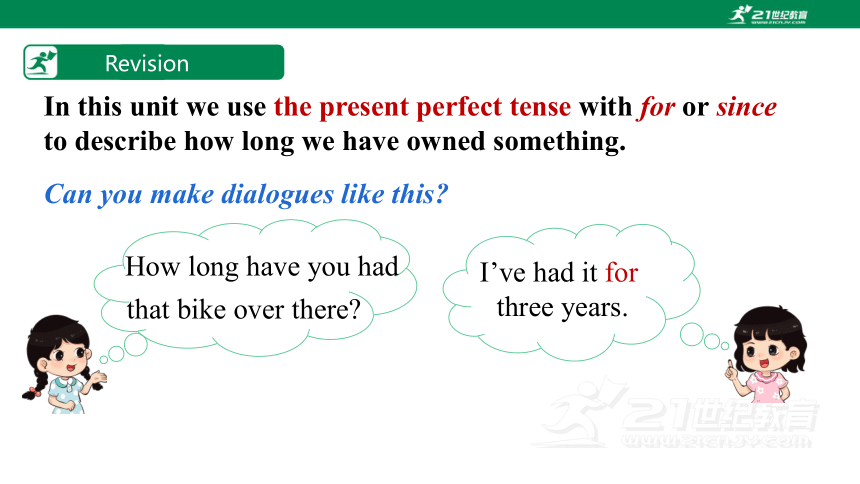
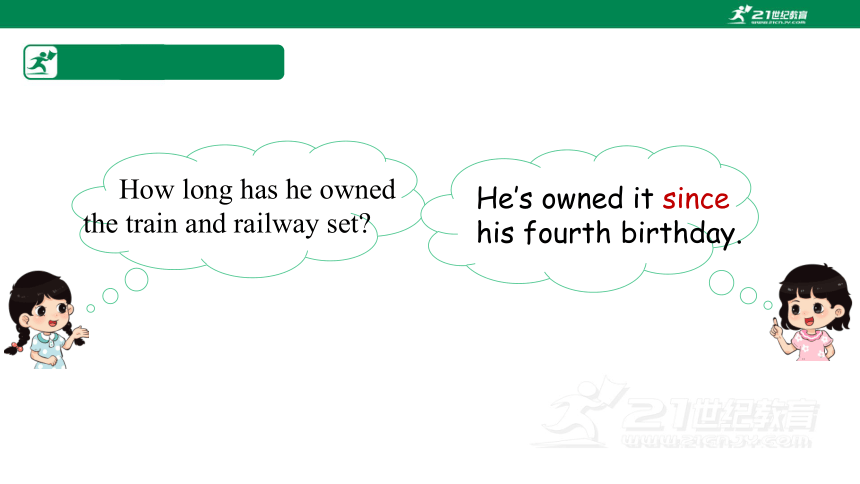
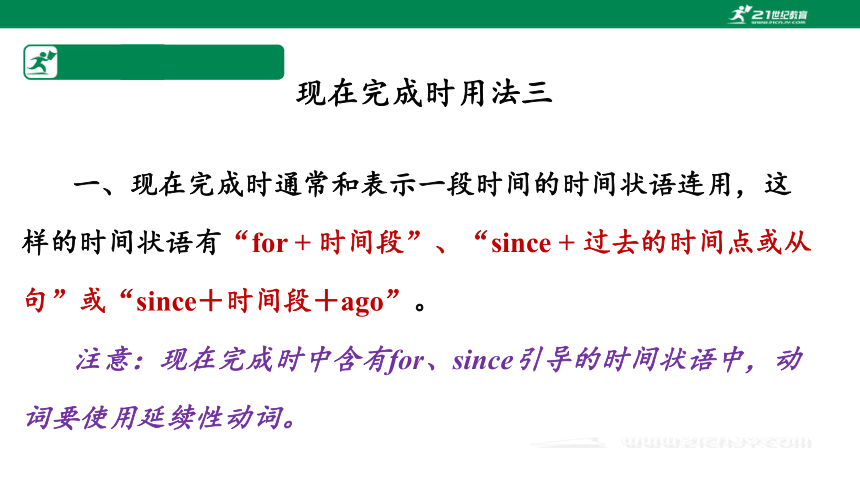
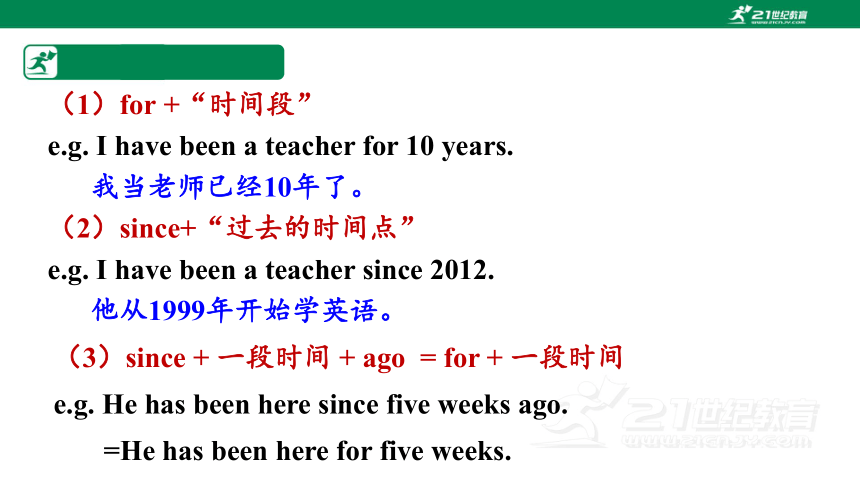
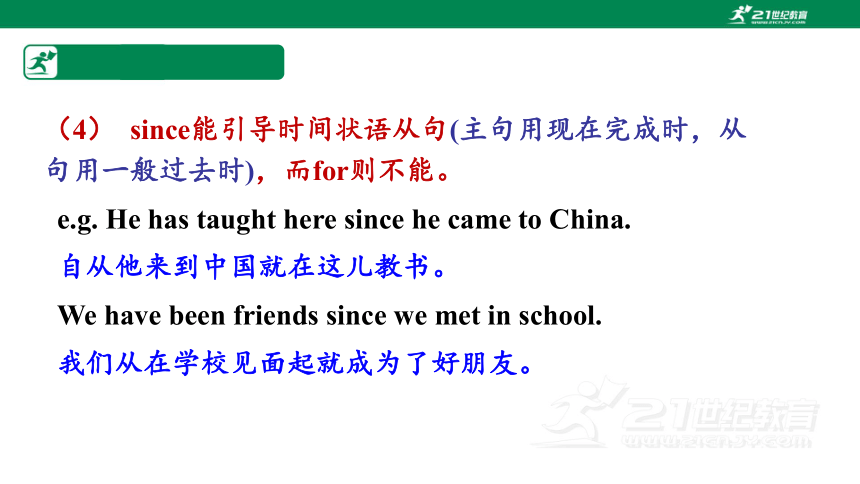
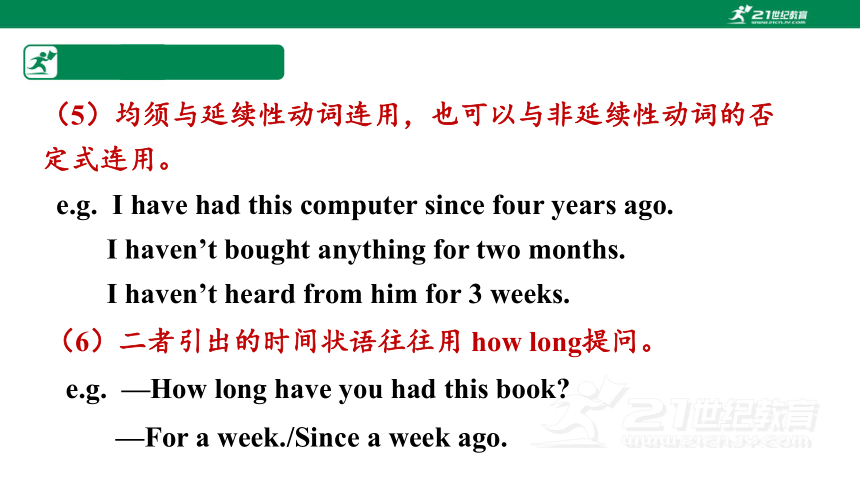
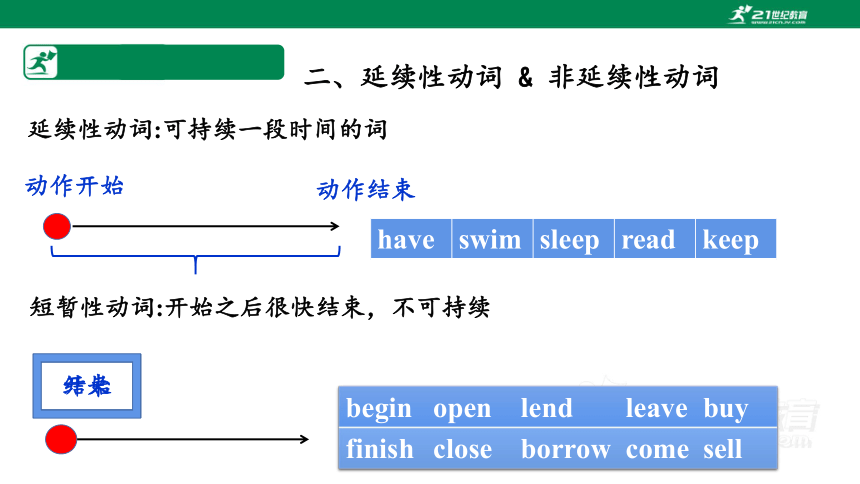
文档简介
(共24张PPT)
Unit 10 I've had this bike
for three years.
Section A (Grammar-4c)
人教版八年级下册
Learning objectives
Key words & phrases:
hometown, own, a lot
Key sentences:
I’ve had it for three years.
He’s owned it since his fourth birthday.
I haven’t played for a while now.
Use for and since correctly in present perfect tense;
Distinguish continuous verbs and non-continuous verbs.
Revision
In this unit we use the present perfect tense with for or since to describe how long we have owned something.
Can you make dialogues like this
How long have you had
that bike over there
I’ve had it for
three years.
How long has he owned
the train and railway set
He’s owned it since
his fourth birthday.
一、现在完成时通常和表示一段时间的时间状语连用,这样的时间状语有“for + 时间段”、“since + 过去的时间点或从句”或“since+时间段+ago”。
注意:现在完成时中含有for、since引导的时间状语中,动词要使用延续性动词。
现在完成时用法三
(1)for +“时间段”
e.g. I have been a teacher for 10 years.
我当老师已经10年了。
(2)since+“过去的时间点”
e.g. I have been a teacher since 2012.
他从1999年开始学英语。
(3)since + 一段时间 + ago = for + 一段时间
e.g. He has been here since five weeks ago.
=He has been here for five weeks.
e.g. He has taught here since he came to China.
自从他来到中国就在这儿教书。
We have been friends since we met in school.
我们从在学校见面起就成为了好朋友。
(4) since能引导时间状语从句(主句用现在完成时,从句用一般过去时),而for则不能。
(5)均须与延续性动词连用,也可以与非延续性动词的否定式连用。
e.g. I have had this computer since four years ago.
I haven’t bought anything for two months.
I haven’t heard from him for 3 weeks.
(6)二者引出的时间状语往往用 how long提问。
e.g. —How long have you had this book
—For a week./Since a week ago.
二、延续性动词 & 非延续性动词
动作开始
动作结束
开始
结束
延续性动词:可持续一段时间的词
短暂性动词:开始之后很快结束,不可持续
have swim sleep read keep
begin open lend leave buy
finish close borrow come sell
非延续性动词转换为延续性动词
将非延续性动词转化为“be+形容词或副词”
begin (start) (开始)
go there (去哪里)
come back (回来)
come here (来这里)
be on
be there
be back
be here
有的非延续性动词可以转化为意思相同的延续性动词:
borrow → keep(借) become → be (成为)
receive → have (收到) go to sleep → sleep (睡觉)
(穿) put on
(认识) get to know
(买) buy
(感冒) catch a cold
wear / be on
know
have (own)
have a cold
V.→V.
buy
borrow
catch
V.→be+adj.
open
close
die
marry
V.→be+adv
leave
come
go
finish
begin
V.→be+名词短语
join
have
keep
have
be open
be closed
be dead
be married
be away (from)
be here
be there
be over
be on
be a member of
be in
非延续性动词转换为延续性动词
巧记瞬间性动词的转换:
开始离去借来还, 出生入死买到家,
穿衣入睡要感冒, 开开关关变结束。
1 begin be on 6 return be back
2 leave be away from 7 join be in
3 go be off 8 die be dead
4 borrow keep 9 buy have
5 come be here 10 arrive be here
11 reach be here 12 put on wear
13 fall asleep be asleep 14 catch a cold have a cold
15 open be open 16close be close
17 become be 18 end/finish be over
5 come be here 10 arrive be here
1. Jim is in Japan. He arrived there three days ago.
2. They are very hungry. Their last meal was ten hours ago.
3. I have a camera. I bought it in 2009.
4. I know Anna. I first met her three years ago.
5. Linda is ill. She became ill on Monday.
Rewrite the sentences using or or since.
4a
1. Jim is in Japan. He arrived there three days ago.
2. They are very hungry. Their last meal was ten hours ago.
3. I have a camera. I bought it in 2009.
4. I know Anna. I first met her three years ago.
5. Linda is ill. She became ill on Monday
Jim has been in Japan for three days.
They have not eaten for ten hours.
I have had a camera since 2009.
I have known Anna for three years/since three years ago.
Linda has been ill since Monday.
I _______________ (never be) to the water park before. I want to _____ (go) next month before the weather gets too cold.
2. They __________________ (never own) any pets, but they ________________ (always want) to have a dog.
3. We _________ (have) a piano since last November. We _______ (buy) it from the Li family when they moved to the US last year.
4. Cathy and Amy ____________ (not be) back to their hometown for two years. They ______ (miss) their hometown a lot and hope to visit the place next year.
5. This museum _________ (be) here for over 20 years. It _____ (be) one of the oldest buildings in this small town.
have never been
go
have never owned
have always wanted
have had
bought
haven’t been
miss
has been
is
Fill in the blanks with the correct forms of the verbs in brackets.
4b
4c
Fill in the questions and ask two students. Then complete the chart.
1. Do you have a(n) ______________ How long have you had it
2. Do you own a(n) _______________ How long have you owned it
Things How long
Tony favorite book for two years
basketball since he was 10 years old
Student 1
Student 2
Exercise
Ⅰ. 用 since 或 for 填空
1.I have stayed in the class_____ she left here.
2.Our teacher has studied Japanese____ ten years.
3.Amy is in her office. She has been there ______ 7 o'clock.
4.I have kept some money from Mike ______ two years ago.
He has been here ____ a week.
It’s about ten years ____ she left the city.
since
for
since
since
for
since
Ⅱ.用适当的时态填空
She's ______(live)here ever since she was ten.
Both of them ______(be)in Hong Kong for ten days.
Both of them ______(come)to Hongkong ten days ago.
Half an hour ______(pass)since the train ______(leave)
Mary ______(lose)herpen.___you___(see) here and there
came
have been
lived
see
Did
has lost
has passed
left
1.Tell the differences between for and since.
2.Master the Continuous verbs and noncontinuous verbs
summary
Homework
1. Review Grammar.
2. Finish the exercises in the workbook.
谢谢
21世纪教育网(www.21cnjy.com)
中小学教育资源网站
兼职招聘:
https://www.21cnjy.com/recruitment/home/admin
Unit 10 I've had this bike
for three years.
Section A (Grammar-4c)
人教版八年级下册
Learning objectives
Key words & phrases:
hometown, own, a lot
Key sentences:
I’ve had it for three years.
He’s owned it since his fourth birthday.
I haven’t played for a while now.
Use for and since correctly in present perfect tense;
Distinguish continuous verbs and non-continuous verbs.
Revision
In this unit we use the present perfect tense with for or since to describe how long we have owned something.
Can you make dialogues like this
How long have you had
that bike over there
I’ve had it for
three years.
How long has he owned
the train and railway set
He’s owned it since
his fourth birthday.
一、现在完成时通常和表示一段时间的时间状语连用,这样的时间状语有“for + 时间段”、“since + 过去的时间点或从句”或“since+时间段+ago”。
注意:现在完成时中含有for、since引导的时间状语中,动词要使用延续性动词。
现在完成时用法三
(1)for +“时间段”
e.g. I have been a teacher for 10 years.
我当老师已经10年了。
(2)since+“过去的时间点”
e.g. I have been a teacher since 2012.
他从1999年开始学英语。
(3)since + 一段时间 + ago = for + 一段时间
e.g. He has been here since five weeks ago.
=He has been here for five weeks.
e.g. He has taught here since he came to China.
自从他来到中国就在这儿教书。
We have been friends since we met in school.
我们从在学校见面起就成为了好朋友。
(4) since能引导时间状语从句(主句用现在完成时,从句用一般过去时),而for则不能。
(5)均须与延续性动词连用,也可以与非延续性动词的否定式连用。
e.g. I have had this computer since four years ago.
I haven’t bought anything for two months.
I haven’t heard from him for 3 weeks.
(6)二者引出的时间状语往往用 how long提问。
e.g. —How long have you had this book
—For a week./Since a week ago.
二、延续性动词 & 非延续性动词
动作开始
动作结束
开始
结束
延续性动词:可持续一段时间的词
短暂性动词:开始之后很快结束,不可持续
have swim sleep read keep
begin open lend leave buy
finish close borrow come sell
非延续性动词转换为延续性动词
将非延续性动词转化为“be+形容词或副词”
begin (start) (开始)
go there (去哪里)
come back (回来)
come here (来这里)
be on
be there
be back
be here
有的非延续性动词可以转化为意思相同的延续性动词:
borrow → keep(借) become → be (成为)
receive → have (收到) go to sleep → sleep (睡觉)
(穿) put on
(认识) get to know
(买) buy
(感冒) catch a cold
wear / be on
know
have (own)
have a cold
V.→V.
buy
borrow
catch
V.→be+adj.
open
close
die
marry
V.→be+adv
leave
come
go
finish
begin
V.→be+名词短语
join
have
keep
have
be open
be closed
be dead
be married
be away (from)
be here
be there
be over
be on
be a member of
be in
非延续性动词转换为延续性动词
巧记瞬间性动词的转换:
开始离去借来还, 出生入死买到家,
穿衣入睡要感冒, 开开关关变结束。
1 begin be on 6 return be back
2 leave be away from 7 join be in
3 go be off 8 die be dead
4 borrow keep 9 buy have
5 come be here 10 arrive be here
11 reach be here 12 put on wear
13 fall asleep be asleep 14 catch a cold have a cold
15 open be open 16close be close
17 become be 18 end/finish be over
5 come be here 10 arrive be here
1. Jim is in Japan. He arrived there three days ago.
2. They are very hungry. Their last meal was ten hours ago.
3. I have a camera. I bought it in 2009.
4. I know Anna. I first met her three years ago.
5. Linda is ill. She became ill on Monday.
Rewrite the sentences using or or since.
4a
1. Jim is in Japan. He arrived there three days ago.
2. They are very hungry. Their last meal was ten hours ago.
3. I have a camera. I bought it in 2009.
4. I know Anna. I first met her three years ago.
5. Linda is ill. She became ill on Monday
Jim has been in Japan for three days.
They have not eaten for ten hours.
I have had a camera since 2009.
I have known Anna for three years/since three years ago.
Linda has been ill since Monday.
I _______________ (never be) to the water park before. I want to _____ (go) next month before the weather gets too cold.
2. They __________________ (never own) any pets, but they ________________ (always want) to have a dog.
3. We _________ (have) a piano since last November. We _______ (buy) it from the Li family when they moved to the US last year.
4. Cathy and Amy ____________ (not be) back to their hometown for two years. They ______ (miss) their hometown a lot and hope to visit the place next year.
5. This museum _________ (be) here for over 20 years. It _____ (be) one of the oldest buildings in this small town.
have never been
go
have never owned
have always wanted
have had
bought
haven’t been
miss
has been
is
Fill in the blanks with the correct forms of the verbs in brackets.
4b
4c
Fill in the questions and ask two students. Then complete the chart.
1. Do you have a(n) ______________ How long have you had it
2. Do you own a(n) _______________ How long have you owned it
Things How long
Tony favorite book for two years
basketball since he was 10 years old
Student 1
Student 2
Exercise
Ⅰ. 用 since 或 for 填空
1.I have stayed in the class_____ she left here.
2.Our teacher has studied Japanese____ ten years.
3.Amy is in her office. She has been there ______ 7 o'clock.
4.I have kept some money from Mike ______ two years ago.
He has been here ____ a week.
It’s about ten years ____ she left the city.
since
for
since
since
for
since
Ⅱ.用适当的时态填空
She's ______(live)here ever since she was ten.
Both of them ______(be)in Hong Kong for ten days.
Both of them ______(come)to Hongkong ten days ago.
Half an hour ______(pass)since the train ______(leave)
Mary ______(lose)herpen.___you___(see) here and there
came
have been
lived
see
Did
has lost
has passed
left
1.Tell the differences between for and since.
2.Master the Continuous verbs and noncontinuous verbs
summary
Homework
1. Review Grammar.
2. Finish the exercises in the workbook.
谢谢
21世纪教育网(www.21cnjy.com)
中小学教育资源网站
兼职招聘:
https://www.21cnjy.com/recruitment/home/admin
同课章节目录
- Unit 1 What's the matter?
- Section A
- Section B
- Unit 2 I'll help to clean up the city parks.
- Section A
- Section B
- Unit 3 Could you please clean your room?
- Section A
- Section B
- Unit 4 Why don't you talk to your parents?
- Section A
- Section B
- Unit 5 What were you doing when the rainstorm came
- Section A
- Section B
- Review of Units 1-5
- Unit 6 An old man tried to move the mountains.
- Section A
- Section B
- Unit 7 What's the highest mountain in the world?
- Section A
- Section B
- Unit 8 Have you read Treasure Island yet?
- Section A
- Section B
- Unit 9 Have you ever been to a museum?
- Section A
- Section B
- Unit 10 I've had this bike for three years.
- Section A
- Section B
